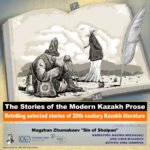
Magzhan Zhumabaev is one of the fathers of modern Kazakh literature. Born in 1893 to a wealthy family in North Kazakhstan, he became one of the co-founders of the reformist political movement Alash Orda. Zhumabaev was a highly educated intellectual with wide-ranging interests who believed in the power of education: he spoke Arabic, Farsi, and Turkish and translated such prominent Western and Russian poets as Goethe and Lermontov into Kazakh. His first poetry collection, “Sholpan,” was written in Kazakh using Arabic script. Like many others, his life came to a premature end in 1938, in the midst of Stalin’s purges, but his wife preserved his writings for more than two decades in hopes that his name would be restored. Her hopes came to fruition: In 1960, Magzhan Zhumabaev was posthumously rehabilitated by a military tribunal. And with that, his poems returned to the people.
Today, we will talk about one of his short stories, The Sin of Sholpan, written in 1923. Though Zhumabaev mainly wrote poems, this story is a very significant part of his ouevre. It centers on a young girl named Sholpan who strives to be happy in her marriage but, overwhelmed by her own thoughts and expectations, ultimately fails to do so.
Full text
Sholpan, unlike thousands of Kazakh girls, married for love. Yet in the first years of her marriage, Sholpan prayed to God not to give her a child. Her husband, Sarsenbay, loved her madly. She cherished this love and did not want a child to come between them, destroying her happy life. Nor had Sarsenbay ever reproached her for not giving him children.
One autumn evening, Sarsenbay went to a friend’s home. As night fell, he watched his friend’s three small children play. He thoroughly enjoyed watching their pranks and playing with them. Returning home late that night, Sarsenbay told his wife—who had been worried by his long absence—about the children and how much he had enjoyed playing with them. Sholpan’s heart sank. She was suddenly concerned that they did not have children. When their love inevitably cooled, children would be able to unite them, she thought to herself.
That very night, Sholpan began to pray to God for a child. Indeed, the young girl became obsessed with this thought. For some reason, she kept her desire for a child to herself, not mentioning it even to her husband. Sarsenbay once, in passing, quoted the saying that “A house without children is a grave,” inadvertently aggravating Sholpan’s torments. She embarked on the path of faith. She devoted herself to praying five times a day, turned to sorcerers and healers, and cried until she had no more tears. And still nothing happened.
When all these efforts failed to produce a child, Sholpan lost faith. She came to the conclusion that God had no power to help her conceive a child. Instead, it was up to her: she needed to rekindle her relationship with her husband. Sholpan became more passionate. Sarsembay, noticing these changes in his wife, was puzzled, but not knowing her true intentions, only chuckled affectionately at Sholpan. This caused her great offense: the person dearest to her did not understand her.
Years passed. Sholpan’s mind became confused, but she could not halt her obsessive thoughts about having a child. She began to question: “Why isn’t Sarsenbay talking about children?” Increasingly, Sholpan came to suspect that Sarsenbay could not have children. Her all-encompassing love was shaken; in her soul, she now blamed Sarsenbay for all her troubles and misfortunes.
But who can pull their shabby family longboat onto the shore of happiness?
– Of course, Sholpan, Sholpan alone, must do this—not only for herself, but also for her husband. Sholpan must give birth to a child.
Even if she commits a sin deeper than the depths of the sea and higher than the highest of the mountains, she must do it! The Lord must forgive a sin committed for a noble purpose. Yes, God is merciful, will he forgive? God will forgive, but will people forgive? Not for nothing do the Kazakhs say: “Even if you steal, but make wealth, even if you sin, but give birth to a child” … “May the one who invented this proverb be cursed! Damn him! Lord, forgive me, only I ask for forgiveness from you … ” Sholpan, shedding bitter tears, indulged in these sinful thoughts in the eighth year of her married life with Sarsenbay.
Spring had come. Sholpan sat sewing at her house, but her thoughts were miles away. She was tormented by an obsession.
In her head, she was secretly auditioning candidates for the role of father of her child. Immediately, she thought, “A servant won’t do—he cannot father a strong personality.” Then she thought of Azimbay. Young, handsome, of noble birth, he was a distant relative of her husband.
Suddenly, as if having heard Sholpan’s thoughts, Azimbay appeared and began to tease her, flirting as he usually did. Staring him in the eye, Sholpan posed a question directly: could he keep their secret? In sudden passion and delight, Azimbay almost kissed Sholpan in front of everyone.
That night, having dressed up, Azimbay came to Sholpan. Sholpan’s heart screamed from deep shame, but she sinned. After the act, Sholpan began to cry. She wanted to pour out her soul to Azimbay, she wanted to explain why she had done this, but Azimbay was not interested. He was only concerned with her body and did not notice her tears. He said that he wanted to come to Sholpan a second time. Sholpan wanted to refuse, but the desire to become pregnant took over. She allowed him to come a second time. As expected, she became pregnant; the sin turned into a blessing.
However, the trysts with Azimbay did not stop. A woman’s soul is deeper than the sea.
Sarsenbay is the husband, Azimbay is the father of the child. People began to gossip; even her mother-in-law began to suspect something. Sholpan was careless at first, but then she understood that the rumor could reach her beloved husband, Sarsenbay.
Their relationship changed. Sarsenbay, who had once been loving and caring, became rude and violent. He swore at Sholpan constantly and even once beat her for breaking some dishes. Filled with trepidation, Sholpan silently waited for him to ask about her infidelity. She wanted to explain the motives for her actions. But Sarsenbay remained silent.
Once, when Sarsenbay was away on one of his regular trips to the city, Azimbay stayed overnight at Sholpan’s home. Suddenly and unexpectedly, Sarsenbay returned in the middle of the night. Sholpan awoke in horror. She pinched Azimbay to wake him, and he managed to escape—but not unnoticed. Indeed, Sarsenbay saw Azimbay escaping. Furious, he turned to Sholpan and began mercilessly beating her in the stomach. Sholpan cried out that there was a child there. Sarsenbay grew irate and replied that he had not asked for this child.
Hearing the uproar, the neighbors ran to Sholpan’s home. Seeing the scene, they joined her husband in hurling insults at his wife. Sholpan was barely alive when Sarsenbay declared that he no longer wanted to live with her. Temir, a wandering pilgrim who stood nearby, intervened and offered that Sholpan’s sin could be washed away. At once, women ran to bring water, which they used to douse Sholpan. Sholpan’s life passed before her eyes.
… Here she braided new sholpas into braids and, enjoying their ringing sound, she moved her head again and again, packing her dowry in the chest … Here she, after begging her mother, attends an all-girls’ party … Here is Sarsenbay’s first arrival … Their first night … Here hodja rolls his bull eyes, expelling evil spirits from her … Azimbai’s black mustache …
A woman, clenching teeth and muttering something, tipped a second bucket over her.
– Oh, Allah! – Sholpan barely whispered.
– Whore, what do you care about Allah? one of the women exclaimed.
“Don’t worry, my dear, it’s all because of your youth … may God give you peace of mind,” said the second.
Sholpan said not another word, and had no more thoughts. Gradually, the blood in her body turned to ice, and her consciousness faded until it disappeared completely. Sholpan’s eyes seemed to close by themselves. The third bucket, the fourth, the fifth… For some time, her body continued to tremble under the torrent of icy water, but eventually it lay still.
Around noon the next day, Sholpan forcefully opened her eyes and whispered:
– “Where is my child? Why won’t this… come and visit?” With these words, she clung to the corner of the korpe, hugging it. Although her lips were barely moving, she clearly wanted to utter something. Yet exhausted by this effort, she fell back and lost consciousness before succeeding.
At sunset, Sholpan bade farewell to life.
*
In The Sin of Sholpan, Magzhan Zhumabaev tells the story of a young woman who, out of love for her husband, becomes lost between honor, love, duty, and infidelity. Unbeknownst to her, Sholpan embarked on a futile struggle with God, people, fate—with everything that is greater and more powerful than she is. Her defeat, then, is inevitable—even if there is an excuse for her attempt. Sinking into the abyss of dishonor, Sholpan embarks on the path of a mother, “high and divine.” But her thoughtless striving for a full existence, the romanticized family ideal, is deeply tragic. Throughout, Zhumabaev masterfully conveys the deep psychological experiences that she goes through, leading us to pity and empathize with the unfortunate Sholpan.
With this work, Magzhan Zhumabaev explores a fundamental philosophical and ethical problem: the fatal loneliness of every individual, which is predetermined and impossible to overcome. It is foolish and selfish to look for something in another person to fill the void in our own existence, Sholpan’s story shows—loneliness is inevitable, as it existed before us and will continue to exist even when we are long gone.




